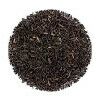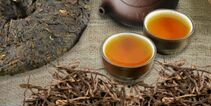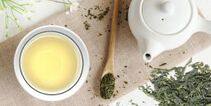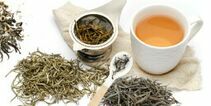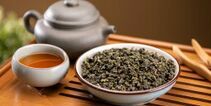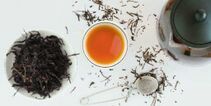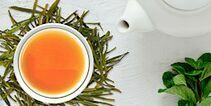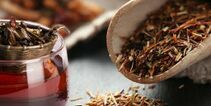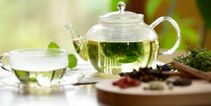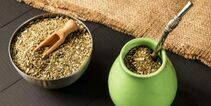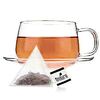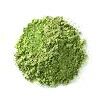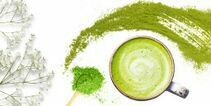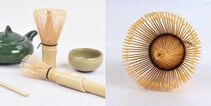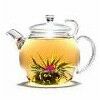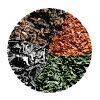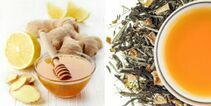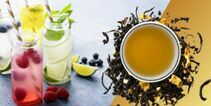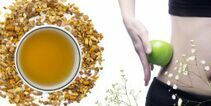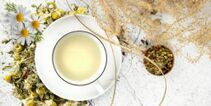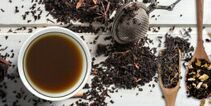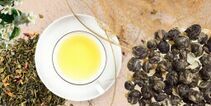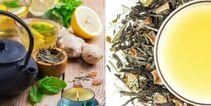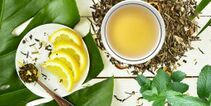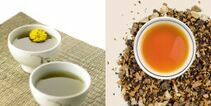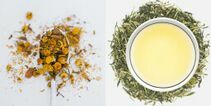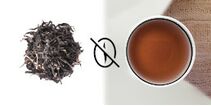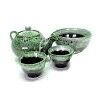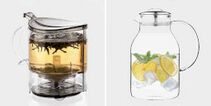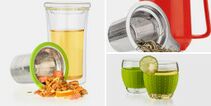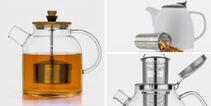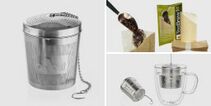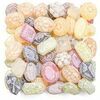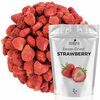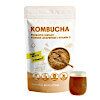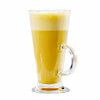[EN] The Japanese do not make pu-erh or grow the types of tea from which it is made. Pu-erh by definition is made in Southern China (Yunnan) and it's borders from a local Assamica of varying types and degrees of cultivation. It appears the Japanese are performing wo-dui on their tea (most likely Chinensis). So while this may be a type of fermented tea it is not pu-erh. I have not tried but maybe I'll get a sample. There are many types of fermented teas like heichas and lui bao and such so it not like pu-erh is the only one.
[EN] Japanese Pu’erh (BestBy: 11-2019).
This is a terrific tea, in my opinion, and this is my third buy of it from Tealyra. Expensive to begin with, the price has risen 11% in the past year, but still worth the occasional splurge. The dry tea is loose, with smallish twist easily measured by spoon, and has a mild, sweet scent. Label suggests 1 tsp per cup (8 oz.) 95C water with a 3 min brew, but that is WAY too strong for my tastes. I use a pennyweight (2.5g) per cup (250 ml) water. As this is Pu’erh, I first rinse the measured tea in a fine-mesh basket under hot running tap water for 10 seconds to remove dust, etc. Then I steep each infusion for 25-30 seconds, up to a minute on the last infusion, to obtain a deep amber, crystal clear tea with great notes of roasted-rice that linger in the back of the mouth after each sip. Five completely flavorful, savory infusions from each pennyweight, before the leaves give out. No foul odors, fishiness, or compost-heap notes whatsoever with this tea. Contrary to other commentary, I find absolutely no resemblance to coffee, either. This tea is smooth, non-astringent, and very pleasing to my palate. For mornings where I’m hurried and can’t enjoy all those infusions, I use 0.5 g tea (1/4 tsp), rinse for 10 s under hot tap water, and infuse in a cup of boiling water for 3-4 minutes a single time only, to obtain a full-flavored, well-balanced cup of tea, discarding the leaves after the single infusion. Highly recommended.
[EN] the caramel is extremely prevalent to me in this tea. its a wonderful cold weather mild pu-erh with a great full mouth feel and light flavor. please don't stop selling this tea
[EN] This Japanese puerh is amazing. Its flavor is clean and fresh and rich and deep. A must try!
[EN] I'm finding I dislike most Pu'er tea, but I do like this Japanese Pu'erh so much that I've re-ordered! The flavor is complex and unique, without the compost-heap taste, without dirt or seaweed on the tongue, or dirty sock stench. Instead, the fermentation with rice yeast has made these tea leaves potent, flavorful, savory, and satisfying! It's now my daily morning brew. 1 tsp. per 8 oz. boiling water in a basket of a small teapot, steeped for 3 minutes. (I always wash the leaves under hot running tap water for 10 seconds first.) A second 8 oz. steep is as satisfying as the first. Hardly recognizable as Pu'erh, there is still a hint of woodsy, clean-leaf taste that makes this brew really wonderful. Worth the premium price!
Stephane Dudart
Décembre 2015
[EN] I already bougth this tea thanks to your UK and USA websites online store last year. This tea is for me the best I can drink. Its taste is complex, sweet and it is the best Pur-Erh I have ever drunk. I enjoy the new EU Tealyra's website because my order arrive to me more quickly !!!
[EN] A Slightly smoky flavor with notes of wood and caramel. Very different from the Chinese version that has a strong taste of wetland. I appreciate this japanese version.
[EN] not quite as "smoky" as I like, but still very enjoyable
[EN] I would drink this tea everyday if it weren't pricey.
[EN] Not a pu erh lovers choice. Black tea lovers would get a kick out of it. Flaw #1 it is just a roasted fermented hajicha. 2) It doesn't have the kick of a pu erh but rather, of a green tea. 3 If you like Japan, you will like the scent of it.
Timor Tarnopolski
Juillet 2018
[EN] Really good tasting Tea, mild taste of peach (do not forget that taste is subjective). I am giving a 4 star only because it is not the usual Puerh taste that you expect. However, I still like it!
[EN] A second, larger order of this tea was not as intense or full-flavored as my first order. But that didn’t stop me from guzzling through all 200g of the tea leaves in just a couple months! Unique, delicious, and memorable. Notes of dry toast or soda crackers. Great breakfast brew, but only good for two western-style steepings.
Professor Levine
Septembre 2024
[EN] We have been drinking this style of tea for over 15 years, in America, Asia, and Europe. We have been purchasing from Tealyra for over five years. We prepared the tea exactly according to the recommendations, weighing the amount of leaves, measuring the volume of the water, and adjusting the temperature to the exact specifications.
We found this tea to be a much less flavorful version of the Chinese pu'er teas we purchased from Tealyra.








